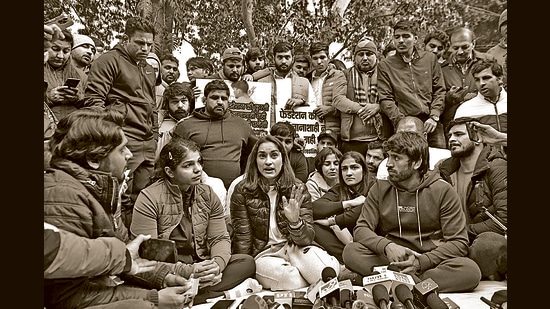Stir by wrestlers uncovers a dark nexus of abuse
Our sportswomen have brought home global laurels. They have battled social and economic odds to get to where they are. Yet, as the ongoing protests against the wrestling federation chief show, taking on patriarchy, sexism, power and bullying remains an unwinnable fight
To watch one of the country’s most decorated sportswomen break down in tears as she uncovered the underbelly of sexual abuse in her sport is horrifying. Vinesh Phogat was 21 when she reached the Olympics quarter-final in Rio; she won three Commonwealth golds and was feted with both the Arjuna award and the Khel Ratna — India’s highest sporting honours.

Today, she and other top wrestlers, including Sakshi Malik and Bajrang Punia, have been reduced to a sit-in on the streets of the national Capital to protest what they have called the “sexual exploitation of at least 20 women” by the president of the Wrestling Federation of India (WFI) and Bharatiya Janata Party (BJP) Member of Parliament (MP) from Uttar Pradesh (UP), Brij Bhushan Sharan Singh.
So, who is Singh? The six-time MP and three-term head of WFI has always had an unsavoury reputation. A wrestler in his younger years, Singh derived his political clout from the ownership of dozens of educational institutions in Gonda in east-central UP.
I first discovered the insidious clout of Singh as a young reporter in the 1990s when I was sent to cover the arrest of former Union minister Kalpnath Rai, who was tried by a Terrorist and Disruptive Activities court, alongside Singh, on the charge of sheltering terrorists linked to Dawood Ibrahim’s gang. Before that, he was accused by the Central Bureau of Investigation of being one of the 40 responsible for the demolition of the Babri Masjid in 1992.
Eventually acquitted, Singh remained unfazed through controversy after controversy. Which is why it is so incredibly brave of the wrestlers to speak out. Off the record, they — and other officials — speak about threats they have received, including to their lives, from Singh, who left the BJP briefly to join the Samajwadi Party, returning to the fold in 2014.
Watching Phogat lead the protests made me think of her candid admissions of mental health issues in 2021. After she failed to get a medal at the Tokyo Olympics in 2020, she told the Indian Express that she was being treated “... like a dead thing.... One medal [lost] and everything is finished…”. Phogat spoke of battling depression in 2019 and drew parallels with how gymnast Simone Biles pulled out of the Tokyo Olympic finals because of mental health issues. Speaking of her battles since a concussion in 2017 and then Covid-19, Phogat wrote of how no such space was available in India. “Forget pulling out of wrestling, just try saying that you are not ready.”
Now join the dots between Phogat’s revelations at the protests, and her ordeal. Singh called her a khota sikka (counterfeit coin) after her defeat at the Olympics. It is not unreasonable to conclude that Singh and his fiefdom — coaches, the women say, have also been sexually exploitative at training camps — were triggers for mental anxiety, not just in Phogat but in other women as well. While there can be many reasons for mental disorder and every person is unique; from a sporting perspective alone the entrenched misogyny that women athletes say they experienced would have invariably had a direct bearing on their capacity to perform.
Phogat’s protests have pulled the lid off a simmering cauldron of similar experiences by women trying to make it in Indian sport. Is it a coincidence that Haryana, the home state of many wrestlers, recently had to ask its sports and youth affairs minister, Sandeep Singh, to resign? He was accused of sexual harassment by a woman coach who is also a well-regarded athlete.
Despite celluloid soft filters on the lives of Indian sportswomen — from Dangal to Chak De — in reality, the protests by our wrestlers show how the nexus between political power and entrenched misogyny can push female athletes into unwilling silence for years.
Why was someone like Singh the head of WFI? Why are there any politicians in sporting bodies?
And while we are asking these questions, does anyone remember Ruchika Girhotra, molested as a teenager while training at the Haryana Lawn Tennis Association? The police officer she and her family took on kept getting promotions. It was 19 years before SPS Rathore was jailed for six months. By then, Girhotra had taken her own life.
Today, as Phogat speaks of death threats from Singh, how much has changed?
Our sportswomen may have brought home medals. They have battled social and economic odds to get to where they are. Yet, wrestling patriarchy, sexism, corroded power, and bullying remain an unwinnable fight. How tragic, how infuriating, how utterly unacceptable.
Barkha Dutt is an award-winning journalist and author The views expressed are personal
All Access.
One Subscription.
Get 360° coverage—from daily headlines
to 100 year archives.



HT App & Website






